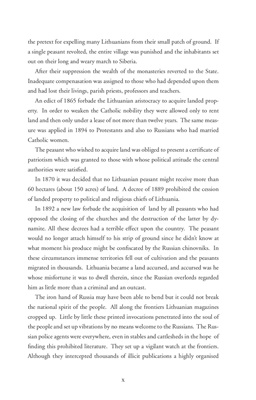
x
the pretext for expelling many Lithuanians from their small patch of ground. If
a single peasant revolted, the entire village was punished and the inhabitants set
out on their long and weary march to Siberia.
After their suppression the wealth of the monasteries reverted to the State.
Inadequate compenasation was assigned to those who had depended upon them
and had lost their livings, parish priests, professors and teachers.
An edict of 1865 forbade the Lithuanian aristocracy to acquire landed property.
In order to weaken the Catholic nobility they were allowed only to rent
land and then only under a lease of not more than twelve years. The same measure
was applied in 1894 to Protestants and also to Russians who had married
Catholic women.
The peasant who wished to acquire land was obliged to present a certificate of
patriotism which was granted to those with whose political attitude the central
authorities were satisfied.
In 1870 it was decided that no Lithuanian peasant might receive more than
60 hectares (about 150 acres) of land. A decree of 1889 prohibited the cession
of landed property to political and religious chiefs of Lithuania.
In 1892 a new law forbade the acquisition of land by all peasants who had
opposed the closing of the churches and the destruction of the latter by dynamite. All
these decrees had a terrible effect upon the country. The peasant
would no longer attach himself to his strip of ground since he didn't know at
what moment his produce might be confiscated by the Russian chinovniks. In
these circumstances immense territories fell out of cultivation and the peasants
migrated in thousands. Lithuania became a land accursed, and accursed was he
whose misfortune it was to dwell therein, since the Russian overlords regarded
him as little more than a criminal and an outcast.
The iron hand of Russia may have been able to bend but it could not break
the national spirit of the people. All along the frontiers Lithuanian magazines
cropped up. Little by little these printed invocations penetrated into the soul of
the people and set up vibrations by no means welcome to the Russians. The Russian police
agents were everywhere, even in stables and cattlesheds in the hope of
finding this prohibited literature. They set up a vigilant watch at the frontiers.
Although they intercepted thousands of illicit publications a highly organised